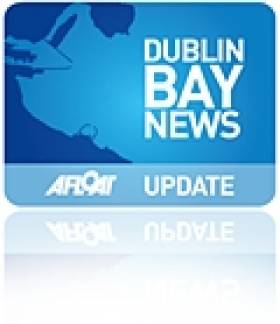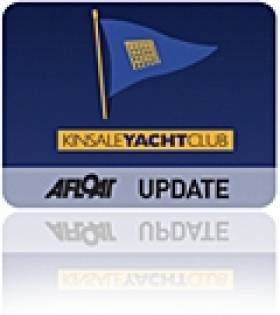Displaying items by tag: Spring Series
Online Entry Now Open for Kinsale Yacht Club’s Spring Series
Entry for the Axiom Private Clients Spring Series in Kinsale Yacht Club is now open online.
The series starts on Sunday 3 April and runs for five weeks, finishing on Saturday 30 April. One race per day is scheduled for both Spinnaker and White Sail classes.
This series is a SCORA event and KYC says it’s looking forward to welcoming participants from other South Coast yacht clubs.
The club is also delighted to welcome Axiom Private Clients once again as title sponsor for the series for 2022.
Former KYC commodore Tom Roche is director of the company, which was founded in 2004 and specialises in dealing with clients with unique circumstances who wish to take control of their personal or corporate finances.
Tom and his wife Ursula look forward to seeing all competitors on the water from their own Solona 45, Meridian, and Axiom wishes all competitors a very enjoyable sailing season.
Competition Keeps Raising The Standard In INSC Spring Series
#INSC - Wind, wind and more wind greeted the participants in the Rathfarnham Ford Dublin Bay Spring Series at the weekend, writes Kenneth Rumball.
This is by far the windiest winter I have known so far with lots of sailing cancelled. Nonetheless the wind gods usually shone on Dublin Bay on Sunday mornings and allowed wind speeds to drop under the usual 40+ knots to allow the two INSC race training boats to compete in the Spring Series.
We weren’t always so lucky with two Sundays' racing lost due to the high winds. Chief organiser Fintan Cairns made an excellent decision to extend the series to run an extra race on 23 March to make up for one of the lost days.
The high winds did not allow the two team INSC boats, helmed and skippered by Kenneth Rumball and Alexander Rumball, to get out and do some pre-event training in their 1720 sportsboats prior to the first race of the series.
The team changed the configuration of their boats somewhat for this series by leaving the Dacron teaching sails on the dock and through some clever thinking modified 1720 class ‘Club’ jibs were able to be mounted on the Harken cruising foils usually used for teaching. Kevlar mainsails were also added in the drive to make the boats more competitive than ever. The signature navy antifouling remained in place to keep the boats from going too fast!
Most of the clients on the two boats had already sailed with team INSC in the DBSC Turkey Shoot Series and in the DBSC Winter Series last winter, so the lost training day did not hamper the teams as much as we had thought it would.
Due to the fact the INSC race teams had done some racing with us before meant we could push our boats harder than before, with our crews definitely making the jump from novice racer to seasoned 1720 crew. We had some fantastic races with both boats honing down wind with the 1720 mast head spinnakers and excellent crew work keeping the hull under the mast.
Screaming by other cruiser-racers with mouths ajar as to the speeds the INSC teams were doing downwind, the GPS on one boat saw a max speed of 16kts one day in a big gust.
Both INSC teams were always at the front of fleet, fighting for line honours. In fact in most races the only boats to place ahead of INSC2 were Wow, the Farr 42, and other much larger boats such as J109s.
The final day of Sunday 23 March saw both boats leaving the pontoons with gusts out in the bay of 30-plus knots. Both sets of crews were a little rusty having had a ‘rest weekend’ over the St Patrick's Day break and nerves were a little high on both boats. This, coupled with a long run from the yellow outfall mark off the West Pier down to the Muglins, meant both boats knew they would have to push hard down-wind to pass the fleet.
And push they did! INSC 1, INSC 2 and Déjà vu all rounded the top mark very closely in that order. A tight top reach mean the kites stayed in the ships, however on gybing around the outfall mark, INSC 2 hoisted their yellow afterburner fractional kite and took off. INSC 1 was a little later behind but had the kite up as soon as possible, with the apparent wind shooting forwards, the two boats along with RIYC2 another 1720, blasted to the Muglins.
By the Muglins, INSC 2 had taken the fleet apart from one boat with INSC 1 and RIYC 2 on their heels. Up the final beat home, INSC 1 and RIYC 2 caught close to INSC 2 with a big left shift. However INSC 2 took line honours with RIYC 2 and INSC 1 on their heels!
In the overall results, INSC 1 finished up seventh with INSC 2 in tenth place - both boats claiming a top 10 finish.
Another fantastic race training programme and what is being dubbed the best race training programme in the bay will continue on Tuesday nights into the summer. If you want to learn how to crew a race boat, check out www.insc.ie.
Coastal Race Adds Spice to Kinsale Sailing Series
#KINSALE – It was back to the big winds and waves this week for the hardy competitors in the KYC Spring Series, with UK Halsey Sailmakers sponsoring events this week, and Des McWilliam himself out on the water checking up on his handiwork writes Peadar Murphy.
For Classes Zero, One and Two, the much anticipated coastal race was the order of the day, with OD Tony Ireson setting a varied and demanding course that tested the stamina of the fleets. Starting in the vicinity of the Bulman, a short beat to Sandycove was followed by a spinnaker reach to CentrePoint and then a two sail reach to the Old Head. The fleets were then faced with a long beat up to the green-coloured Black Tom buoy in Courtmacsherry Bay before launching into a rock and roll run back to the Old Head. Class Two boats headed for Centre Point at that stage, while the bigger boats reached eastwards to the eventually located (thanks Meridian!!) South East Mark and then back to base via Centre Point. With winds constantly above 20 knots at the start, many had taken in a reef and were flying smaller headsails, but by Black Tom, most of the reefs had been shaken out.
In Class Two, Mac Magic II showed their class in the conditions, overhauling the Desmond, Ivers and Deasy outfit on Bad Company at the Old Head and the Beneteau 31.7 showed everyone her transom from then on for a bullet in IRC. A fine provisional second in IRC for Clem and Wendy McElligott's Sea Hawk remains subject to protest due to a mark rounding issue. Iker Martinez was unavailable for comment on the matter as we go to press, but Sea Hawk could lose her pole position overall in ECHO and overall third in IRC if matters go against her! It couldn't be closer at the top of IRC Two overall with Brian Goggin's Allure and Bad Company tied on 14 points.
Class One saw Dave Scott's Eos storming back to winning ways while her arch-rival Jelly Baby had a day that will definitely be discarded by the Nagle and O'Malley team. In IRC, it's down to a single point between the two now, with the RCYC boat edging it. Watch out for some fireworks on Saturday!! Just three points separate the top four boats in ECHIO overall, with Jelly Baby shading it from Dan Buckley's Justus by a point.
Despite having been over the line at the start, and having difficulties with her kite, somehow Kieran Twomey's Gloves Off was still in the shake up at the South East mark, and in the beat up to Centre Point snatched the lead from Tom Roche's Meridian, which had led the fleet from the gun. Gloves Off claimed the bullet in IRC and now holds a three point lead overall from Conor Doyle's Freya, which broke her spinnaker pole as she headed east from the Old Head. John Godkin's Godot lies third overall in IRC, somewhat adrift, but with plenty of sea room between her and the remainder of the fleet. Meridian claimed the bullet in ECHO as her reward for her endeavours. Just 2.5 points now covers all five boats in ECHO with Meridian leading by her bow roller, and Godot and Tony O'Brien's White Tiger tied for second.
Class One boats dominate IRC Restricted with Jelly Baby, Eos and Justus making up the top three, but in truth it's between Jelly Baby and Eos at this stage.
East of Centre Point, OD Tony Small was marshalling Classes Three and Four on windward/leeward courses and his mark layers were kept busy with the shifting winds. In the first race, Finbarr Dorgan's No Half Measures got the better of Marron and O'Connell partnership on Bandit in Class Three IRC, but Padraig O'Donovan's Chameleon held on to claim her second bullet of the series in ECHO.
In Class Four IRC, Alan Mulcahy's Sundancer and Richard Hanley's Saoirse had the racing to themselves with Mulcahy continuing to string the bullets together and almost certain to claim the series overall. In ECHO, the story is much the same with Sundancer and Saoirse out in front, though the Higgins and Morrison duo on La Maraquita remain close enough to keep the top two on their toes.
For the White Sail fleet, OD Donal Hayes sent competitors up to the Spit Mark first, providing welcome entertainment to walkers on Kinsale's Scilly Walk. John Whelan's Wheels continued her eventful Spring Series outing taking up temporary residence on the sand bank off the Block House, but eventually got free. No such troubles hampered John Downing and Samba, which romped home ahead of Dave Akerlind's Paragon and Stephen Lysaght's Reavra in Class One, presenting a wonderful spectacle as they reached to the finish in unison with the returning Class Zero, One, Two and White Sail Two fleets! Overall, Reavra holds a two point lead over the Dann, Murphy and Hennessy team on Val Kriss with Paragon a further point behind. But with the discard not coming into play in White Sail until next week, it's still all to play for here.
The OD's foresight ensured that the Irish Lights Vessel Granuaile would indeed have the Bulman Buoy back in place after servicing it by the time the White Sail Two fleet arrived there. At that stage Kevin Murray's Objection! had built up a commanding lead and duly claimed the win from Billy Joyce's Windrose and Dave Cullinane's Delos. Windrose now leads by two points overall from Delos, but with Delos unable to take to the race course next weekend, there may be an opportunity for the ladies on Guiness Kann to swoop in to claim second spot. Objection! can't be discounted from a podium finish either following her fine finish this week.
The final series of races takes place on Saturday 28th April. If you wish to attend the Prize-giving Dinner, book your tickets now with Ann Kelly in KYC.































































